Picture no longer having to spend a lot of money to heat your home. With the use of heat pump technology, we can revolutionize the way we keep our homes warm, all while keeping our finances in check.
In this article, we will delve into the basics, efficiency, and benefits of heat pump heating. We will explore how these innovative systems work, the different types available, and even compare costs.
Get ready to discover a more affordable and energy-saving way to heat your home.
Key Takeaways
- Heat pump systems offer energy efficiency and cost savings for affordable home heating.
- Proper installation, regular maintenance, and smart thermostat usage can enhance cost savings with heat pump systems.
- Heat pump systems provide both heating and cooling capabilities, making them a year-round heating solution.
- Heat pump systems have a longer lifespan compared to traditional heating systems, making them a durable and cost-effective option.
The Basics of Heat Pump Systems
In this article, we’ll explore the basics of heat pump systems. Heat pump systems are an innovative and efficient way to heat and cool your home. They work by transferring heat from the air or ground outside your home to the inside, providing a comfortable indoor climate.

Heat pump installation is a crucial step in ensuring optimal performance and energy efficiency. It’s important to hire a professional who can properly size and install the system.
Additionally, regular heat pump maintenance is necessary to ensure its longevity and efficiency. This includes regular filter changes, coil cleaning, and checking for any refrigerant leaks.
Understanding Heat Pump Efficiency
To fully grasp the benefits of heat pump systems, we need to understand how heat pump efficiency plays a crucial role in maximizing energy savings. Heat pump efficiency refers to the amount of heat energy produced by the system in relation to the amount of electricity consumed. This efficiency is measured by the coefficient of performance (COP), which represents the ratio of heat output to electrical input. Higher COP values indicate greater efficiency.
The efficiency of a heat pump system is influenced by various factors, including the type of heat pump installation and the operational settings. Proper installation is essential for optimal performance, as it ensures proper sizing, correct refrigerant charge, and adequate air distribution. Additionally, the efficiency of a heat pump can be enhanced by using advanced operational features such as variable speed compressors and smart thermostats.

Understanding heat pump efficiency is crucial for homeowners looking to maximize their energy savings while enjoying affordable home heating. By selecting a high-efficiency heat pump and ensuring proper installation and operation, homeowners can significantly reduce their energy consumption and utility bills.
Benefits of Heat Pump Heating
When it comes to heating our homes, heat pump systems offer several significant benefits.
One of the key advantages of heat pump heating is its energy efficiency. Heat pumps can extract heat from the air or ground and transfer it into our homes, providing a highly efficient heating solution. This increased efficiency translates into cost savings for homeowners, as heat pump systems can reduce energy consumption and lower heating bills.
Additionally, heat pump heating provides a year-round solution, as these systems can also be used for cooling during the summer months.

Energy Efficiency Advantages
Because heat pump systems are designed to transfer heat rather than generate heat, they offer significant energy efficiency advantages for homeowners. Here are four key benefits of heat pump heating:
-
Reduced energy consumption: Heat pumps use electricity to transfer heat from the air or ground, making them more energy-efficient than traditional heating systems. This can lead to significant cost savings on your energy bills.
-
Year-round comfort: Heat pumps provide both heating and cooling capabilities, allowing you to maintain a comfortable indoor environment throughout the year. This eliminates the need for separate heating and cooling systems, saving you money on equipment and installation costs.
-
Environmental friendliness: Heat pumps produce fewer greenhouse gas emissions compared to fossil fuel-based heating systems, making them a more sustainable choice. By installing a heat pump, you can contribute to reducing your carbon footprint and protecting the environment.

-
Longer lifespan: Heat pumps have a longer lifespan compared to traditional heating systems. With proper maintenance and care, a heat pump can last up to 20 years or more, providing you with reliable and efficient heating for many years to come.
Cost Savings Potential
One of the key benefits of heat pump heating is that it can result in significant cost savings for homeowners. By utilizing the natural heat from the environment, heat pumps can provide efficient and affordable heating solutions. Let’s take a look at some energy saving tips and the long-term investment potential of heat pump systems.
| Energy Saving Tips | Long-Term Investment |
|---|---|
| Proper insulation | Lower energy bills |
| Regular maintenance | Increased property value |
| Smart thermostat usage | Reduced carbon footprint |
| Zoning system | Longer lifespan |
Implementing energy saving tips such as proper insulation, regular maintenance, using smart thermostats, and utilizing zoning systems can further enhance the cost savings of heat pump heating. Additionally, heat pump systems can serve as a long-term investment by lowering energy bills, increasing property value, and reducing carbon footprint. With their efficient operation and durability, heat pump systems prove to be a smart choice for homeowners seeking affordable and sustainable heating solutions.
Year-Round Heating Solution
We can enjoy the benefits of year-round heating with heat pump systems. Heat pumps are highly efficient and cost-effective heating options that provide consistent warmth throughout the year.

Here are four reasons why heat pump systems are the ideal year-round heating solution:
-
Energy efficiency: Heat pumps transfer heat from the outside air to warm the interior space, making them highly efficient in both heating and cooling modes. This results in significant energy savings and lower utility bills.
-
Versatility: Heat pumps offer both heating and cooling capabilities, making them a versatile solution for year-round comfort. They can efficiently cool your home during hot summers and provide reliable heating during cold winters.
-
Constant comfort: Heat pump systems provide consistent heating throughout the year, maintaining a comfortable indoor temperature regardless of the outside weather conditions.

-
Environmental friendliness: Heat pumps use renewable energy sources, such as the heat from the air or ground, making them environmentally friendly compared to traditional heating systems that rely on fossil fuels.
With their year-round heating efficiency and cost-effectiveness, heat pump systems are an innovative solution for those seeking reliable and sustainable home heating.
How Heat Pumps Work
Using a refrigerant to absorb heat from the surrounding environment, heat pumps work by transferring this heat indoors to provide efficient home heating. Heat pump installation involves placing the outdoor unit, which contains the compressor and condenser coil, outside the home. The indoor unit, consisting of the evaporator coil and air handler, is installed inside. The refrigerant circulates between the two units, absorbing heat from the outdoor air and releasing it indoors. This process is known as heat pump operation. To better understand how heat pumps work, let’s take a closer look at the components involved:
| Component | Function |
|---|---|
| Compressor | Increases the refrigerant pressure |
| Condenser Coil | Releases heat to the outdoors |
| Evaporator Coil | Absorbs heat from the surroundings |
| Air Handler | Distributes heated air throughout the home |
Now that we have a clear understanding of how heat pumps work, let’s explore the different types of heat pump systems available.

Types of Heat Pump Systems
When it comes to affordable home heating, there are several cost-effective options to consider.
One such option is the use of energy-efficient heat pump systems. These systems come in different models, each with its own set of features and benefits.
Understanding the types of heat pump systems available can help homeowners make an informed decision about the most suitable option for their heating needs.
Cost-Effective Heating Options
While there are various types of heat pump systems available, one cost-effective option is an air-source heat pump. Here are four reasons why an air-source heat pump is a great choice for affordable home heating:
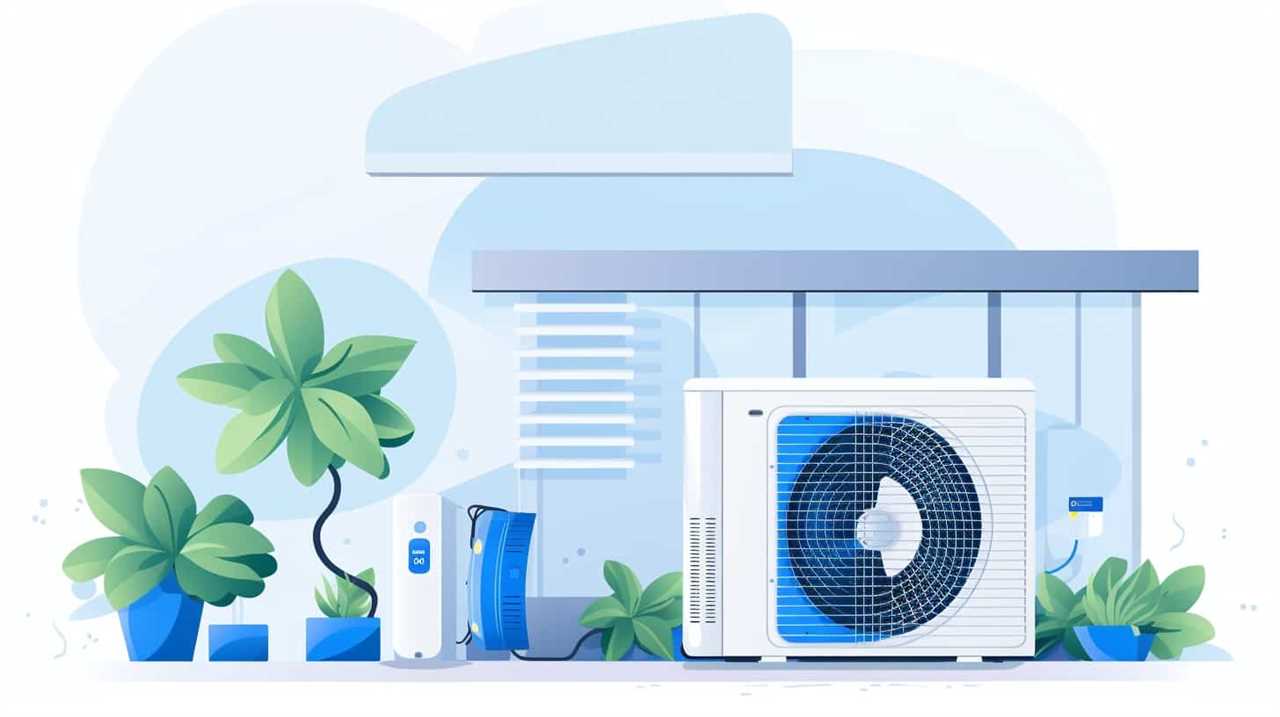
-
Energy Efficiency: Air-source heat pumps use electricity to transfer heat from the outside air to heat the home, making them highly energy efficient. They can produce 3-4 units of heat for every unit of electricity consumed.
-
Cost Savings: Compared to traditional heating systems, air-source heat pumps can save homeowners up to 30-40% on their heating costs. This can result in significant long-term savings.
-
Versatility: Air-source heat pumps can both heat and cool your home, providing year-round comfort. This eliminates the need for separate heating and cooling systems, reducing installation and maintenance costs.
-
Environmental Friendliness: Air-source heat pumps are environmentally friendly as they don’t burn fossil fuels. They produce fewer greenhouse gas emissions, helping to reduce your carbon footprint.
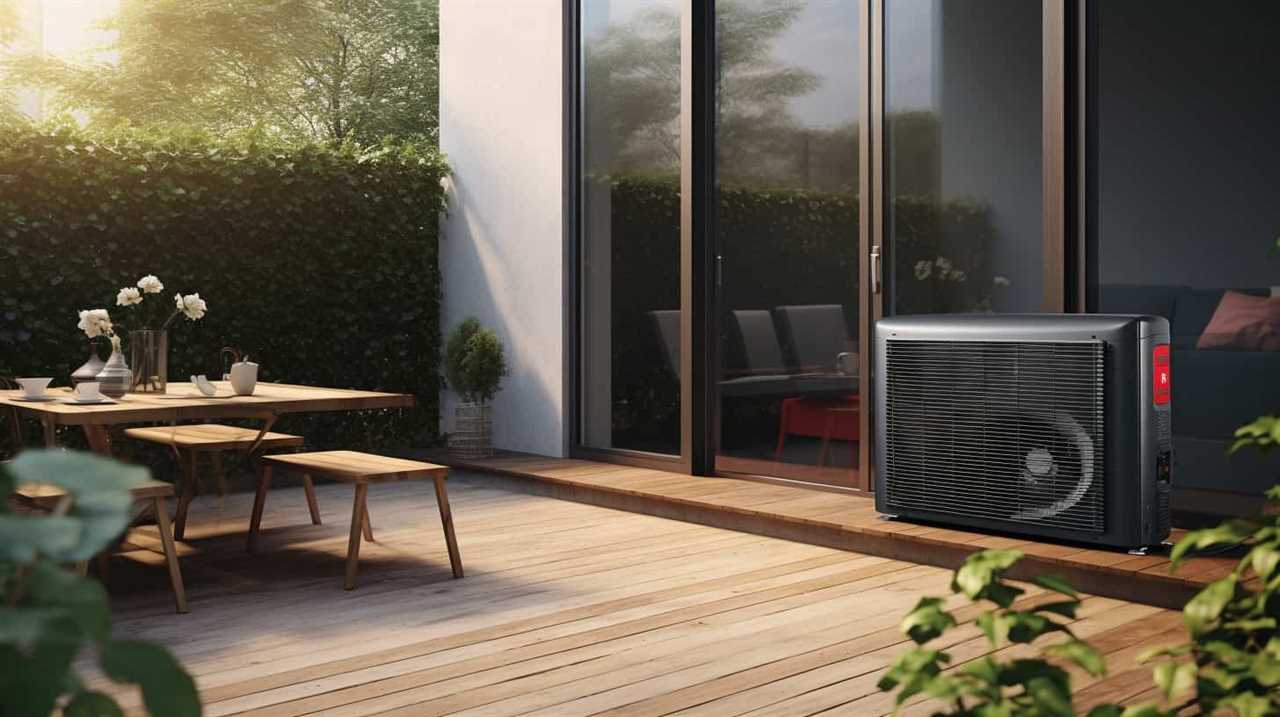
When considering home heating alternatives, a comprehensive heating system comparison should include the cost-effectiveness of air-source heat pumps.
Energy-Efficient Heat Pumps
Let’s explore the different types of energy-efficient heat pump systems. Heat pumps are a great option for homeowners who want to reduce their carbon footprint and save on energy costs. These appliances use renewable energy sources, such as air, water, or the ground, to heat or cool your home. By utilizing the natural heat from the environment, heat pumps can provide efficient heating and cooling throughout the year. There are three main types of heat pump systems: air source, ground source, and water source. Each type has its own unique benefits and considerations.
| Heat Pump System | Energy Source | Efficiency |
|---|---|---|
| Air Source | Outdoor air | Highly efficient |
| Ground Source | Ground | Very efficient |
| Water Source | Water bodies | Efficient |
Now that we understand the different types of energy-efficient heat pump systems, let’s dive into the specifics of different heat pump models.
Different Heat Pump Models
We will now explore the different types of heat pump systems available, each with its own unique features and advantages. When it comes to heat pump installation, it’s important to choose the right model that suits your heating needs. Here are four types of heat pump systems to consider:
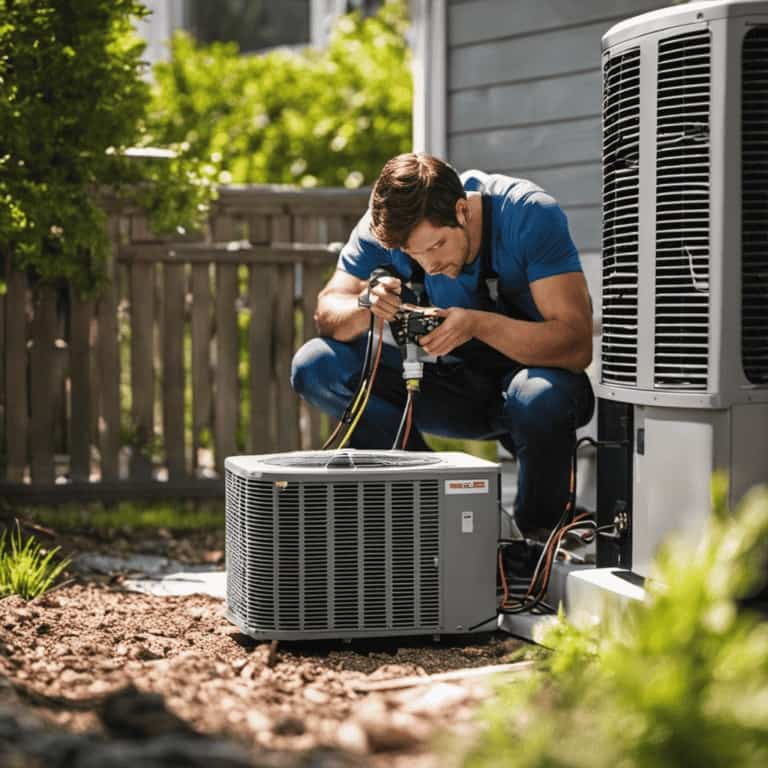
-
Air source heat pumps: These systems extract heat from the outside air and transfer it inside your home. They’re easy to install and maintain, making them a popular choice for homeowners.
-
Ground source heat pumps: These systems use the constant temperature of the ground to provide heating and cooling. They’re highly efficient but require more extensive installation.
-
Water source heat pumps: These systems extract heat from a water source, such as a lake or pond, to heat your home. They’re ideal for homes near a water source.
-
Dual fuel heat pumps: These systems combine a heat pump with a backup heating source, such as a furnace. They automatically switch to the backup source when outdoor temperatures drop too low.

Regular heat pump maintenance is crucial to ensure optimal performance and energy efficiency. It involves cleaning or replacing filters, inspecting electrical connections, and checking refrigerant levels. By choosing the right heat pump model and maintaining it properly, you can enjoy affordable and efficient home heating.
Factors to Consider When Choosing a Heat Pump
One factor we should consider when choosing a heat pump is the size of our home and its heating requirements. Proper heat pump sizing is crucial for efficient and effective heating. Oversized heat pumps may cycle on and off frequently, leading to energy wastage and decreased lifespan. Undersized heat pumps may struggle to meet the heating demands of the home, resulting in discomfort and higher energy bills. To determine the right size, we need to consider factors such as the home’s square footage, insulation levels, number of windows, and climate conditions. Additionally, heat pump installation should be done by qualified professionals who can accurately assess the heating needs and recommend the appropriate system size. The table below summarizes the general heat pump sizing guidelines based on the square footage of the home:
| Home Size (Square Footage) | Heat Pump Size (Tons) |
|---|---|
| Up to 1,500 | 1.5 – 2 |
| 1,501 – 2,000 | 2 – 2.5 |
| 2,001 – 2,500 | 2.5 – 3 |
Comparing Heat Pump Costs
To accurately compare heat pump costs, we need to consider factors such as the initial purchase price, installation expenses, and long-term energy savings.
When evaluating the cost of heat pump installation, it’s important to take into account the complexity of the system and any additional modifications required to your home.

Here are four key factors to consider when comparing heat pump costs:
-
Initial Purchase Price: Compare the prices of different heat pump models, taking into consideration their capacity, efficiency rating, and additional features.
-
Installation Expenses: Factor in the cost of professional installation, as well as any necessary upgrades to your electrical system or ductwork.
-
Long-term Energy Savings: Consider the potential energy savings over the lifespan of the heat pump. Look for models with high energy efficiency ratings to maximize savings.
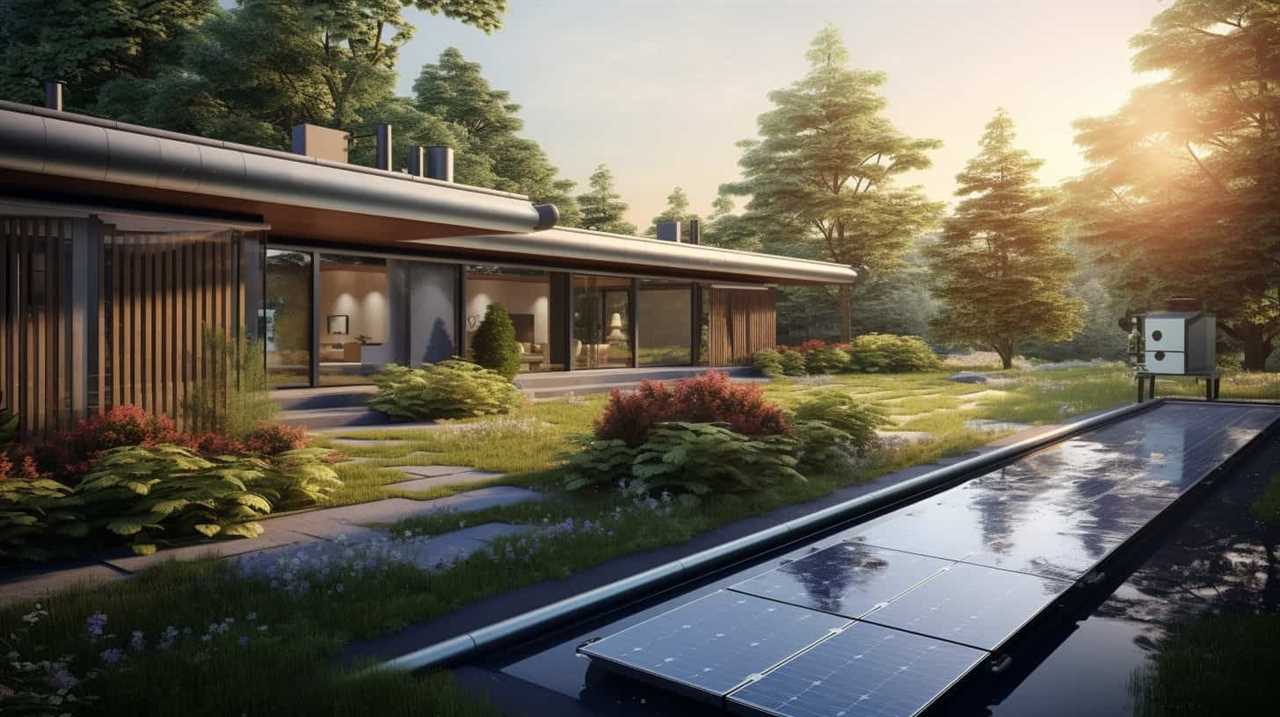
-
Heat Pump Efficiency Comparison: Compare the Seasonal Energy Efficiency Ratio (SEER) and Heating Seasonal Performance Factor (HSPF) ratings of different heat pump models to determine their efficiency.
Energy Savings With Heat Pump Systems
When it comes to energy savings, heat pump systems offer significant benefits.
One of the main advantages is the lowered electricity bills that homeowners can enjoy. Heat pumps are highly efficient in converting energy, resulting in reduced energy consumption and lower costs.
Additionally, these systems promote environmental sustainability by reducing greenhouse gas emissions, making them a smart choice for homeowners looking to save money and reduce their carbon footprint.

Lowered Electricity Bills
We can significantly cut down on our electricity bills by using heat pump systems, resulting in substantial energy savings. Here are four ways heat pump systems help reduce expenses and promote conservation efforts:
-
Higher Efficiency: Heat pumps are more efficient than traditional heating systems, which means they require less energy to produce the same amount of heat.
-
Dual Functionality: Heat pumps can both heat and cool your home, eliminating the need for separate heating and cooling systems and reducing overall energy consumption.
-
Variable Speed Technology: Heat pumps often feature variable speed compressors that adjust their output based on the heating or cooling needs, optimizing energy usage.
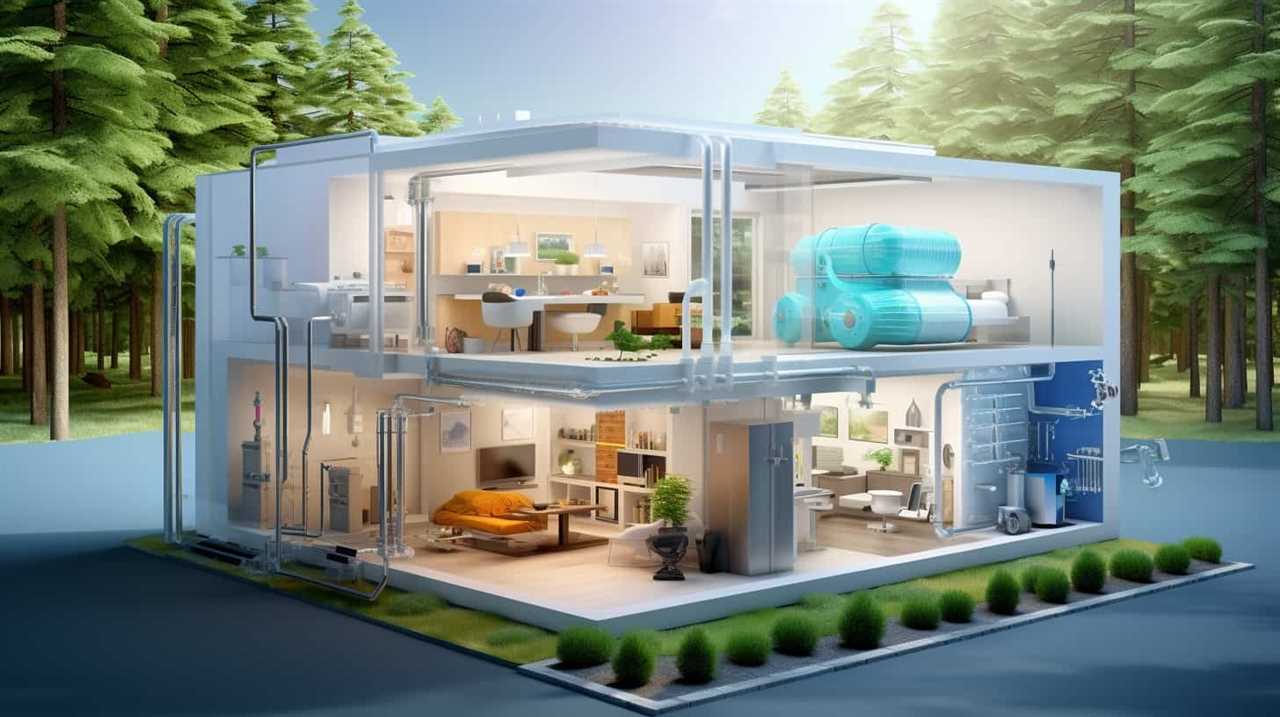
-
Smart Controls: Advanced heat pump systems come with smart thermostats that allow you to program and control the temperature settings remotely, ensuring energy is only used when necessary.
Environmental Sustainability Benefits
By using heat pump systems, we can reduce energy consumption and promote environmental sustainability.
Heat pumps are highly efficient systems that utilize renewable energy sources, such as the heat from the air or ground, to provide heating and cooling for homes.
Compared to traditional heating systems, heat pumps can achieve energy savings of up to 40%. This not only lowers electricity bills but also significantly reduces the environmental impact associated with energy consumption.

According to the U.S. Environmental Protection Agency, heat pumps produce fewer greenhouse gas emissions than other heating systems, contributing to a cleaner and healthier environment.
Maintenance Tips for Heat Pump Systems
Regular maintenance is crucial for the optimal performance and longevity of heat pump systems. To ensure your heat pump operates efficiently, follow this heat pump maintenance checklist:
- Clean or replace air filters every month to improve airflow and prevent dust buildup.
- Inspect and clean the outdoor unit regularly to remove debris and ensure proper airflow.
- Check and clean the indoor coil to remove dirt and improve heat transfer.
- Schedule professional maintenance at least once a year to inspect electrical connections, refrigerant levels, and overall system performance.
By following these maintenance tips, you can maximize the efficiency and lifespan of your heat pump system.
However, even with regular maintenance, issues can still arise. In the next section, we’ll discuss common issues and troubleshooting for heat pumps. Transitioning into the subsequent section, let’s explore how to identify and resolve these common problems.

Common Issues and Troubleshooting for Heat Pumps
Identifying and resolving common issues with heat pumps is essential for maintaining optimal performance and efficiency. Heat pumps are reliable heating systems, but like any mechanical device, they can encounter problems. By understanding the common problems encountered and employing effective troubleshooting techniques, homeowners can ensure their heat pumps continue to operate smoothly.
One common issue with heat pumps is a lack of heat or cool air being produced. This can be caused by a variety of factors, such as a malfunctioning thermostat, low refrigerant levels, or a faulty compressor. Troubleshooting techniques for this problem include checking the thermostat settings, inspecting the refrigerant levels, and examining the compressor for any signs of damage.
Another common issue is the heat pump freezing up. This can occur due to restricted airflow, low refrigerant levels, or a malfunctioning defrost control. Troubleshooting techniques for this problem involve checking the air filters, ensuring proper airflow, and inspecting the refrigerant levels.
Frequently Asked Questions
How Long Does It Typically Take for a Heat Pump System to Pay for Itself in Energy Savings?
It typically takes a heat pump system several years to pay for itself in energy savings. The energy efficiency and cost effectiveness of these systems make them a smart choice for homeowners seeking innovative heating solutions.

Can a Heat Pump System Be Used for Both Heating and Cooling Purposes?
Yes, a heat pump system can be used for both heating and cooling purposes. It offers efficient heating and cooling, making it ideal for commercial buildings. The benefits of heat pump systems include energy savings and environmental sustainability.
Are Heat Pumps Suitable for Extremely Cold Climates?
Heat pumps are efficient in cold climates, but require regular maintenance. Their ability to extract heat from the air decreases as temperatures drop. However, advancements in technology have improved their performance in extreme cold.
Can a Heat Pump System Be Installed in an Existing Home Without Major Renovations?
Installing a heat pump system in an existing home without major renovations is possible. The installation process and cost of retrofitting must be considered. We can provide technical, informative and data-driven guidance for this innovative solution.
How Noisy Are Heat Pump Systems Compared to Other Heating Options?
Heat pump systems have lower noise levels compared to traditional heating options, making them a quieter choice for your home. Additionally, they require less maintenance, providing an innovative and hassle-free solution for affordable home heating.

Conclusion
In conclusion, heat pump systems offer affordable and efficient home heating solutions. With their ability to transfer heat from the air or ground, these systems provide reliable warmth while reducing energy consumption.
By comparing costs and considering long-term energy savings, homeowners can make an informed decision about the best heat pump system for their needs. Regular maintenance and troubleshooting can ensure optimal performance.
Just like a well-maintained heat pump, a smoothly running home is like a symphony, with each component working together to create a harmonious and comfortable environment.









